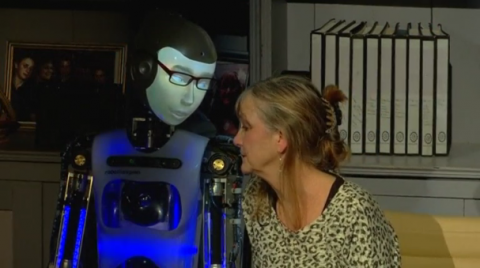
LONDON, United Kingdom (Reuters) — When actress Judy Norman walks on stage for the play “Spillikin,” she performs beside a somewhat different cast member – a humanoid robot.
Featuring a “robothespian,” the play brings love and technology together for a story about a robot maker who builds a robot to keep his wife company after he dies. And, as her dementia develops, it becomes increasingly difficult for her to distinguish the machine from the man.
Britain’s Cornwall-based Pipeline Theater, which has worked with robotics company Engineered Arts for the project, is touring the show around the country.
“We have pre-programmed every single thing the robot says and every single thing the robot does, all the moves,” writer and director Jon Welch said.
“So the robot will always say the same thing and move in the same way depending on what cue is being triggered at what particular time.”
The robot is connected to the theater’s control room, where a laptop triggers cues for its performance.
“(There is) a big pressure on the actor…to always have the right lines, always stand in the right place so that the robot is looking at the right direction at that particular moment,” Welch said.
On stage, Norman talks to the robot and even kisses it. In return, the robot replies, displays facial expressions and moves its hands.
“Working with a robot is something of course I have never done before so it’s a completely different experience,” she said. “When he looks at me, this going to sound weird, but he is very affectionate and I like him, I really like him,” she said.
“Spillikin” runs in London until March 19 and continues its tour until April.








